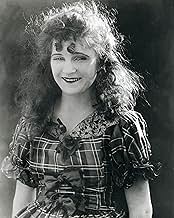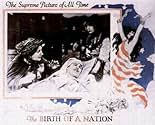The Stoneman family finds its friendship with the Camerons affected by the Civil War, both fighting in opposite armies. The development of the war in their lives plays through to Lincoln's a... Read allThe Stoneman family finds its friendship with the Camerons affected by the Civil War, both fighting in opposite armies. The development of the war in their lives plays through to Lincoln's assassination and the birth of the Ku Klux Klan.The Stoneman family finds its friendship with the Camerons affected by the Civil War, both fighting in opposite armies. The development of the war in their lives plays through to Lincoln's assassination and the birth of the Ku Klux Klan.
- Awards
- 2 wins total
- Col. Ben Cameron aka The Little Colonel
- (as Henry Walthall)
- Silas Lynch - Mulatto Lieut. Governor
- (as George Seigmann)
- Jeff - The Blacksmith
- (as Wallace Reed)
- Abraham Lincoln
- (as Jos. Henabery)
- Wade Cameron - The Second Son
- (as J.A. Beringer)
- Duke Cameron - The Youngest Son
- (as John French)
Featured reviews
One of the posters remarked on how ridiculous the Klansmen's hoods looked. Actually, the original "ghost costumes" were all homemade and there was no standardized uniform- some had spikes on the head, horns, painted faces on the masks, etc.
I myself had an ancestor who was a member of the Reconstruction Ku Klux Klan, and they saw themselves as guerilla fighters against an occupying power, not as terrorists. Today we can condemn them. At the time, it must have seemed to them that the war was over, but that the battle lines were still firmly drawn.
This film is a good peek into the attitude of the general public in 1915 about Reconstruction. It became a national obsession, and probably gave impetus to Col. William Joseph Simmons's decision to "resurrect" the Klan in that year.
It really is almost like two different movies. The first part, which takes place in the era before and during the Civil War, contains little objectionable material, and it deserves praise both technically and for the acting. The second part, set in the reconstruction era, contains almost all of the disturbing material, and it also is really not all that great in terms of cinematic quality.
Then also, the degree to which "The Birth of a Nation" may have influenced the development of cinema has very likely been overstated . The controversy that it generated may very well have helped it to remain better known than other films of the era that were equally innovative and/or lavish, or nearly so.
If the movie had ended shortly after the memorable and well-crafted Ford's Theater scene, the anti-war sentiment and similar themes would remain the main focus, since the effects of war on families and individuals is depicted convincingly and thoughtfully. In that case, its occasional lapses would possibly at the worst be called "dated", given the quality of the rest of this part of the movie.
The second half, though, is completely unfortunate in almost every respect. Not only does it promote a distorted viewpoint, but the story becomes labored, and the characters lose their depth and become more one-dimensional. The purely technical side, such as the photography and the use of cross-cutting, might still be good, but much of the rest of it loses its effectiveness.
Perhaps more importantly, it really seems rather difficult to justify the credit that this one film gets in the development of cinema. There had already been numerous feature-length movies, and most of the techniques that Griffith used were also in use by others. He may well have been ahead of the pack in terms of appreciating their possibilities, but that does not mean that cinema would not have developed as it did without this particular movie.
Just as one example, the Italian epic "Cabiria", from the previous year, has the same kind of lavish scale, is quite resourceful in its techniques, and is quite entertaining, without causing so much controversy.
Other early feature-length films also include some creative efforts to adapt film-making techniques to longer running times and more complex stories. Finally, many short features from the pre-Griffith era experimented with the same kinds of techniques that he later would use systematically. There's no denying Griffith's considerable technical skill, but others of the era also deserve some credit, even if they and their works were less controversial, and are now largely forgotten as a result.
Films showing conflicts must present both sides as believing utterly in the righteousness of their cause; but historical films also have at least a moral responsibility to ensure the material shown has some reasonable approximation to historical accuracy, and whenever possible the convictions of both sides should be equally fairly presented. Most of the criticisms of TBOAN on this database derive not from its sympathetic presentation of the KKK but from the fact that this is presented as the only side which is relevant. We need to remember that slavery was introduced into human society back in prehistoric times - it was usually associated with a recognised obligation on the part of the slave-owner to provide a reasonable standard of living for his slaves, and alternative mediaeval societies from which slavery had been eliminated often did not do even this for their dispossessed citizens. Members of ruling classes everywhere lived a lifestyle which required the full time labours of many slaves or underprivileged workers to maintain, and only after the invention of the steam engine did it become possible to picture a world from which slavery might eventually be eliminated. Although this then probably became inevitable, its elimination has still not been completed; and in the United States it took place in an appallingly destructive way, part of which is pictured in TBOAN. Every nation has shameful episodes in its history which have and will cause distress for many generations before they are gradually outgrown. Recognising that the American Civil War did not result only from a dispute about slavery but much more from a whole range of economic and cultural issues, I appreciate that it would be grossly improper for me as a Canadian to seize on some of the controversial aspects of TBOAN as an excuse to condemn the film. I will re-watch it as a valid and important effort to document the concerns of the group of citizens it featured (although I will still reserve the right to feel Griffith should have made more effort to also document the concerns of those with opposing viewpoints.) My concerns here are directed more to assessing the importance of TBOAN in the development of the modern cinema, and I currently find myself siding with the relatively few users who have commented that its significance seems to be greatly overrated. When I first saw this film I had seen relatively few of the important early silent films, and it was easy to accept claims that Griffith's work was of overwhelming importance. Now I have seen other contemporary works; and have also come to appreciate that all surviving copies of about 90% of these works have totally disappeared (whilst probably half of the 10% of which copies still exist are not available for home viewing even from specialist libraries as the only copies are located in inaccessible archive collections). This is not brought out clearly by most of the 200 user comments on this film listed by IMDb, and it is so important that it has led me to pen these further comments. Film-makers in the silent era were extremely productive - Griffith himself is credited by IMDb with having directed over 500 films, most of them silent, and several other directors/producers have well over 100 films credited. Since so few survive, we must recognise how far our current assessment of early directors might change if we were able to see and compare more of their works. I believe that many innovations in film technology have been exclusively attributed to Griffith primarily because of the ready availability today of copies of 'TBOAN', 'Intolerance' and 'Orphans of the Storm'. I found this feeling very strongly reinforced when I had a rare chance to see a screening of Lois Weber's 'Hypocrites'. Weber was, for a time, the highest paid director in Hollywood and received a best director award in 1916 (ahead of Griffith, just one year after he released TBOAN). All I will say at this point is that, although I am admittedly relying on rather uncertain memories, I believe 'Hypocrites' was more stimulating for its innovative cinematographic techniques than 'Intolerance'. It would be interesting to know whether other database users have had similar thoughts about this or other early works.
Griffith's portrayal of Reconstruction black politicians is not only racist, but blatantly untrue. Only in rare instances and for a short time did black representatives control any Southern legislatures, and this at a time when they were the majority of voters in many Southern states! For years teachers of Reconstruction have emphasized carpetbaggers, but have ommitted the fact that the post-Reconstruction governments were founded with the explicit purpose of disenfranchising blacks and violently enforcing their underclass status. For this reason and others, Birth of a Nation's claims to historical accuracy would be comical, if not for the horrific implications of the film.
That said, this film should be seen, mainly because it provides a document of a poisonous way of thinking that is by no means dead. It also represents the pop cultural moment when Northern and Southern whites reconciled over the memory of the Civil War, mainly to the detriment of blacks. Lastly, those who want this film burned only give ammunition to the idiots who still praise the KKK. It's better to let these jerks hang themselves with their own rhetorical ropes than to let them claim victim status.
Did you know
- TriviaPresident Woodrow Wilson is famously rumored to have responded to the film with the remark: "It is like writing history with lightning. And my only regret is that it is all so terribly true." After the film became subject of controversy due to its heroic portrayal of the Ku Klux Klan, Wilson denied through his press secretary as to having known about the nature of the film before screening it at the White House, or having ever endorsed it. Nevertheless, Wilson's published works as a historian are closely aligned with the film's negative portrayal of Reconstruction (some of his writings are even quoted onscreen in certain prints of the film). Wilson was also notably a consistent pro-segregationist as President.
- GoofsThe Ku Klux Klan never fought or won any battles with federal troops, black or white.
- Quotes
intertitle: While youth dances the night away, childhood and old age slumber.
- Crazy creditsThe following was listed in the opening credits: A PLEA FOR THE ART OF THE MOTION PICTURE We do not fear censorship, for we have no wish to offend with improprieties or obscenities, but we do demand, as a right, the liberty to show the dark side of wrong, that we may illuminate the bright side of virtue--the same liberty that is conceded to the art of the written word--that art to which we owe the Bible and the works of Shakespeare.
- Alternate versionsIn both 1921 and 1927, edited versions of the film were released to reflect current political viewpoints.
- ConnectionsEdited into The Revenge of Pancho Villa (1932)
Details
Box office
- Budget
- $110,000 (estimated)
- Runtime
- 3h 15m(195 min)
- Sound mix
- Aspect ratio
- 1.33 : 1













































